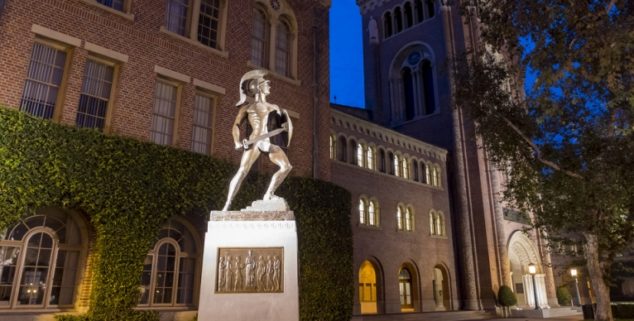News
Money, chicanery fuel college admissions uproar
 The life-size bronze statue of Tommy Trojan on the campus of the University of Southern California. (Photo: Kit Leonjg, via Shutterstock)
The life-size bronze statue of Tommy Trojan on the campus of the University of Southern California. (Photo: Kit Leonjg, via Shutterstock)It’s pretty much all there: money, celebrity, scandal, more money, cheating, coaches being bribed — advantage layered over advantage.
In what federal law enforcement officials say is the “largest college admissions scam ever prosecuted by the Department of Justice,” federal prosecutors have accused dozens of wealthy parents of making at least $25 million in illegal payments in one form or another to get their unqualified children into select colleges, including the University of Southern California, UC Berkeley, Stanford and UCLA. Several school officials also have been named in the schemes, which apparently began eight years ago.
“Regular hardworking people have perhaps a naïve belief that the system would treat them fairly.” — Jose Medina
In one case reported by the L.A. Times, an unidentified parent was described as paying $6.5 million to get a child into a prestigious school. The paper also reported that federal investigators were tipped to the scheme by a wealthy suspect in a separate multimillion-dollar fraud case who sought to cut a deal.
The scandal has provoked coast-to-coast soul-searching among the higher education establishment and in California’s Legislature, where a half-dozen bills have been introduced targeting the issue. The legislation includes closing admission loopholes, eliminating the SAT and ACT tests and halting the practice of preferential admissions.
At USC, two of the school’s top officials — Provost Michael Quick and General Counsel Carol Mauch — are leaving that institution, according to a letter to the faculty from the university’s interim president.
“The scandal shakes the confidence of the American public that hard work will pay off … we’re in an absurd place,” said Assemblyman Jose Medina, D-Riverside. “Regular hardworking people have perhaps a naïve belief that the system would treat them fairly.” Medina chairs the Assembly’s higher education committee.
Medina added that colleges were “snookered.”
“This is not about looking for wrongdoing on the part of colleges,” he said.
“The scandal is an assault on the people of California and the University of California,” said Assemblyman Kevin McCarty, D-Sacramento, who sits on the Assembly Education Committee.
The comments came during a recent session of Assembly Budget Subcommittee on Education and Finance, which McCarty chairs. McCarty said he and his colleagues will continue to examine the situation.
“We know that this episode has jarred the trust of many Americans in the college admissions process, and it has prompted many questions from the Stanford community.” — Marc Tessier-Lavigne
Despite the apparent tendency of legislators — thus far — to not blame the colleges, both UC President Janet Napolitano and the new president of USC, Carol Folt, have launched exhaustive internal investigations.
Already, Stanford University’s head sailing coach John Vandemoerhas has been fired, and so were USC’s senior associate athletic director, Donna Heinel, and men’s water polo coach Jovan Vavic.
Stanford officials, in an attempt to regain the trust of the public, alumni and student body, said they are reworking the system in which athletes can be accepted by the school through a “side door.”
“We know that this episode has jarred the trust of many Americans in the college admissions process, and it has prompted many questions from the Stanford community. We are determined to take the right steps at Stanford to ensure the integrity of our process and to work toward rebuilding that trust,” Stanford President Marc Tessier-Lavigne and Provost Persis Drell declared in a March 21 “Notes from the Quad” blog post.
Admissions decisions by prestigious colleges had spotty records decades before the scandal broke, however.
Stanford, for instance, refused admission to Joan Didion, one of the 20th Century’s foremost writers. (Didion then attended Sacramento City College and UC Berkeley.)
According to USC, the university had an all-time high of 64,256 high school seniors applying for admission in 2018, making it the third most sought-after school in the nation among private research universities. The applicant pool in 2018 was double what it was seven years ago. The university admitted 8,258 freshmen in 2018. Of those, the university reports, 26 percent were underrepresented minority students and 14 percent were the first generation in their families to attend college. Fifteen percent were students whose parents are USC alumni. Children of alumni were admitted at twice the rate of non-alumni offspring.
Over the last 20 years, the university has enjoyed a rise in prestige. US News & World Report ranked USC 44th nationally; this year, it ranks 22nd, along with UC Berkeley and Georgetown.
The scandal is a sensational reminder of the seemingly permanent chasm separating the haves from the have-nots in today’s society.
But in the end, admission or refusal at the nation’s most prestigious colleges may not matter that much.
Earlier this year, Gallup asked 5,100 graduates about the career helpfulness of their undergraduate alumni networks, and just 9 percent of graduates told Gallup the school network has been very helpful or helpful to them in the job market.
Want to see more stories like this? Sign up for The Roundup, the free daily newsletter about California politics from the editors of Capitol Weekly. Stay up to date on the news you need to know.
Sign up below, then look for a confirmation email in your inbox.

Leave a Reply